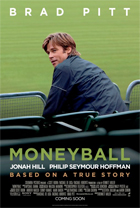Moneyball
|  Moneyball takes the underdog sports genre, one of the most fabled of Hollywood’s fabled story arcs, and turns it inside out by taking us off the field of play and into the back offices of major league baseball, giving us a fascinating glimpse into all the managing, strategizing, trading, and money exchanging that constitutes the real pulse of professional athletics. As the title of the film’s source, Michael Lewis’s 2003 nonfiction bestseller Moneyball: The Art of Winning an Unfair Game, attests, baseball is always rigged: Those teams with the deepest pockets field the best teams and win the big titles. Moneyball takes the underdog sports genre, one of the most fabled of Hollywood’s fabled story arcs, and turns it inside out by taking us off the field of play and into the back offices of major league baseball, giving us a fascinating glimpse into all the managing, strategizing, trading, and money exchanging that constitutes the real pulse of professional athletics. As the title of the film’s source, Michael Lewis’s 2003 nonfiction bestseller Moneyball: The Art of Winning an Unfair Game, attests, baseball is always rigged: Those teams with the deepest pockets field the best teams and win the big titles.Moneyball opens with video footage of the 2002 playoff series between the Oakland A’s and the New York Yankees, the latter of whom prevailed. A not surprising statistic follows: The Yankees were working with a $114 million budget, the A’s were working with a $39 million budget. This is a cold, hard fact with which the A’s manager Billy Beane (Brad Pitt) must constantly deal, especially when his three best players are lured away at the end of the season by bigger paychecks that he can’t match. The A’s owner is unwilling to expand the team’s budget, and Billy’s scouts, a roomful of graying, cantankerous veterans, can’t imagine working any way except the way they’ve worked for the past three decades. Billy knows that the scouts are essentially practicing voodoo despite their protestations about experience and knowledge because Billy had been recruited into major league baseball right out of high school by scouts who claimed he was a rare mixture of all the right skills, yet he turned out to be a failure who never lived up to the hype (his name, while not a fictional creation, feels like an almost too-perfect evocation of the transcendent all-American baseball wunderkind, making his professional fall from grace, which is scattered throughout the film in short flashbacks, all the more poignant). In a moment of serendipity during a trading session with the Cleveland Indians, Beane meets Peter Brand (Jonah Hill), a recent Yale economics graduate who has developed a new system for building a team. Rather than focusing on a range of abilities and immediately counting out players who have various problems (old injuries, problematic off-field behavior, weak throwing skills), he analyzes players statistically using a single metric: their ability to get on base. According to Peter, when stripped down to the basics, the game of baseball is won or lost by players getting on base, and he feels that if a team can be assembled of players whose statistical probability of getting on base is high, that team will be a winner in the end. “Like an island of misfit toys,” he says, and Billy buys into it, hiring him away from the Indians and making the introverted, roly-poly Ivy Leaguer his assistant general manager. This, of course, flies in the face of all received wisdom in baseball, and for a while makes Billy both the laughing stock of the league and persona non grata among his scouts and the A’s manager, Art Howe (Philip Seymous Hoffman), a grizzled veteran who is already bitter about being on a one-year contract and resents being handed a team of “misfit toys” who Billy and Peter want him to play in ways that, in his mind, make no sense. But, wouldn’t you know it, the plan actually starts to work, suggesting that the “old ways” aren’t always the best ways. The screenplay by Oscar winners Steven Zaillian and Aaron Sorkin, draws the best of both worlds with Zaillian’s sense of structure and attention to detail and Sorkin’s whip-smart dialogue. While not as screwball-fast and head-spinning as it was in The Social Network (2010), the dialogue in Moneyball tends to come fast and furious, especially when Billy is on the phone with multiple parties wheeling and dealing trades like an auctioneer on speed. Brad Pitt, who is aging gracefully into an actor whose dexterity and nuance matches his larger-than-life star power, is well cast as Billy, bringing the character both a golden-boy-in-his-later-years aura and an internal streak of desperation and self-doubt that is manifested in his unwillingness to watch his own team play lest his jinx them. Casting Jonah Hill as Peter was a risky move, but one that pays off as he buttons down his typically manic persona and demonstrates that he is surprisingly adept at playing the straight man. Director Bennett Miller (Capote), picking up after Steven Soderbergh left the production, handles the behind-closed-doors drama with a style that respects the inherent intrigue of the action; there is no false aesthetic manipulation to heighten the film’s heavy exchanges, and as a result Moneyball unfolds smoothly as the kind of baseball movie that even those who couldn’t care less about baseball will find engrossing. Copyright ©2011 James Kendrick Thoughts? E-mail James Kendrick All images copyright © Columbia Pictures |
Overall Rating: 

 (3)
(3)


